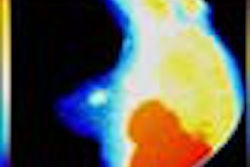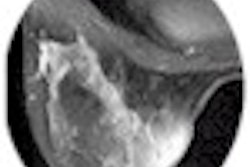VIENNA - A multidisciplinary approach to breast cancer screening resulted in a higher identification rate (IR) of smaller tumors, as well as less anxiety for patients. Researchers from Centro di Prevenzione Senologica in Verona, Italy shared the results of their clinic’s multidisciplinary approach at the European Congress of Radiology on Friday.
"The advantages of this approach are that there is less stress for the women, it’s less time-consuming, and there is better adherence to the second diagnostic level. The drawbacks are the higher cost and the need for dedicated specialists," said Dr. Francesca Caumo, who presented the study.
During a one-year period, 7,590 women, ranging in age from 50 to 69 years, underwent traditional two-view mammograms, which were immediately read by a radiologist. When further diagnostic assessment was necessary (additional mammography, ultrasound, cytology, or core needle biopsy), a surgeon or pathologist was consulted in that same session.
According to the results, the center’s recall rate was 10.9%, or 826 women. Based on the diagnostic work-up, 237 (4.3%) patients had negative results, 153 (2%) were scheduled for a short-term follow-up, and 108 (1.4%) required surgical intervention.
Among the latter 108 patients, 86 malignant tumors were found, as well as 20 benign lesions. The identification rate was 11.3% while the IR for tumors smaller than 1 cm was 4.9%. While the multidisciplinary approach did produce a higher recall rate -- without immediate testing, the recall rate stood at 3% -- it did result in a 1.3% increase in pinpointing small tumors, Caumo said.
Although her group did not conduct a financial analysis of offering such comprehensive care, Caumo said she estimated that the annual cost of running such a program would be about 500,000 euros.
In a related study published recently in Radiology, the psychological effect of false-positive screening results and the subsequent diagnostic workup on patients was the subject of a survey conducted by a multidisciplinary team from the University of California, Davis. Researchers from the department of radiology and the department of human and community development questioned 121 women who had either undergone an immediate workup and received reports of a false-positive screening mammogram, or who had returned at a later date for a workup and reporting.
"Findings of this retrospective study suggest that the stress experienced by women with false-positive screening mammograms can be significantly reduced by providing immediate on-site diagnostic imaging, followed by communication of the results by the radiologist," wrote Dr. Karen Lindfors and her colleagues (Radiology, January 2001, Vol.218:1, pp.247-253).
By Shalmali Pal
AuntMinnie.com staff writer
March 3, 2001
Click here to post your comments about this story. Please include the headline of the article in your message.
For more coverage of the European Congress of Radiology, visit our RadCast@ECR special edition.
Copyright © 2001 AuntMinnie.com



















